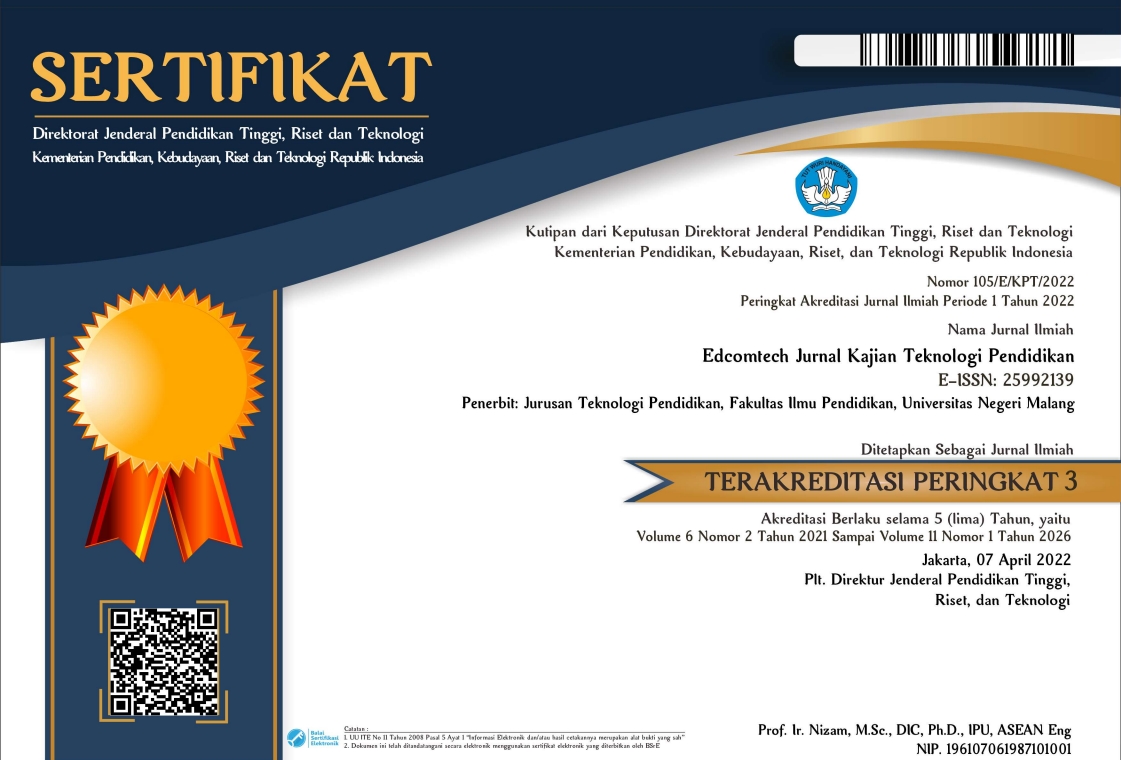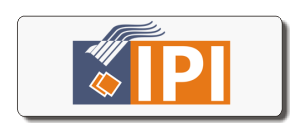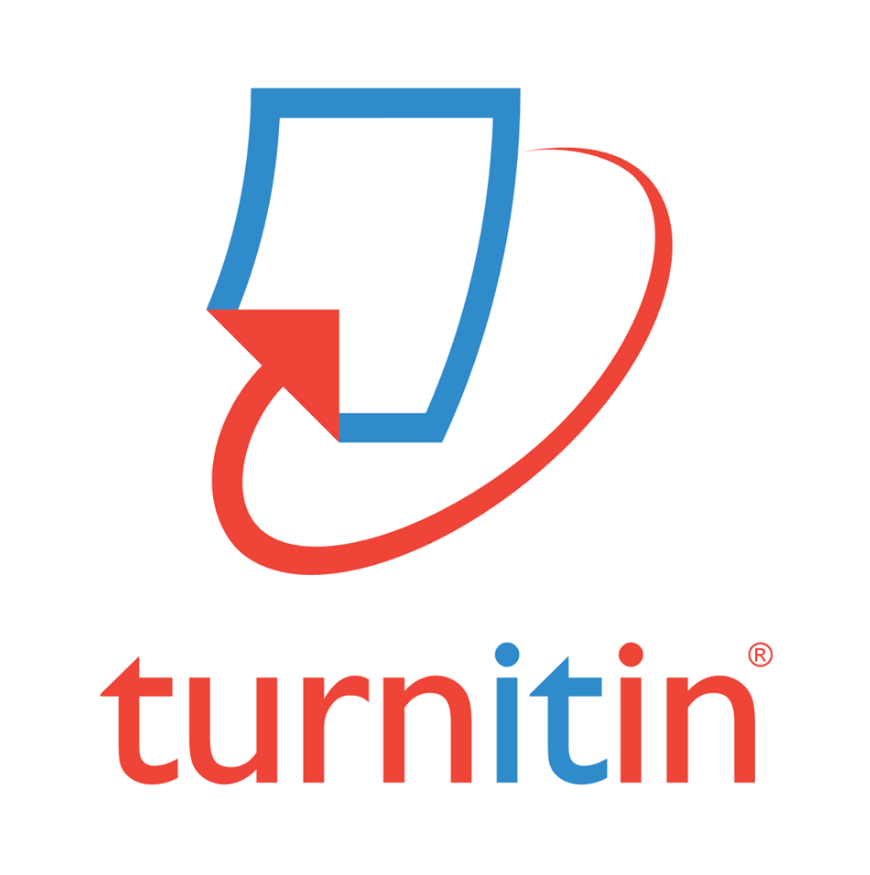Hubungan Intensitas Penggunaan Teknologi Informasi Dan Komunikasi Dengan Keterlibatan Belajar Mahasiswa Generasi Z
Abstract
Abstrak: Penelitian ini bertujuan untuk menelaah hubungan antara intensitas penggunaan teknologi informasi dan komunikasi dalam dunia pendidikan terhadap keterlibatan belajar mahasiswa generasi Z. Metode yang digunakan adalah pengisian kuesioner mengenai keterlibatan belajar oleh mahasiswa generasi Z (n=108). Diperoleh hasil bahwa jangka waktu pertama kali mengenal dan durasi penggunaan teknologi informasi dan komunikasi berkorelasi negatif dengan keterlibatan belajar mahasiswa. Sedangkan, penggunaan teknologi informasi dan komunikasi yang bertujuan untuk kepentingan akademis berkorelasi positif terhadap keterlibatan belajar siswa. Mahasiswa generasi Z sebaiknya mampu meregulasi diri untuk dapat memanfaatkan teknologi informasi dan komunikasi untuk tujuan akademis.
Abstract: This study aims to examine the relationship between the intensity of the use of information and communication technology in education to the learning engagement of Generation Z students. The method used is filling out a questionnaire regarding learning involvement by Generation Z students (n = 108). The result shows that the time period for the first time to recognize and the duration of the use of information and communication technology is negatively correlated with student learning engagement. Meanwhile, the use of information and communication technology aimed at academic interests is positively correlated to student learning engagement. Generation Z students should be able to regulate themselves to be able to utilize information and communication technology for academic purposes.
Keywords
Full Text:
PDFReferences
Asosiasi Penyelenggara Jasa Internet Indonesia. (2018). Survei Nasional Penetrasi Pengguna Internet 2018. Jakarta.
Anderson, B., Fagan, P., Woodnutt, T., & Chamorro-Premuzic, T. (2012). Facebook psychology: Popular questions answered by research. Psychology of Popular Media Culture, 1, 23–37.
Beetham, Helen & Sharpe, Rhona. (2013). Rethinking pedagogy for a digital age: Designing for 21st Century Learning. USA: Routledge.
Awan, M.A. & Khan, H.U. (2016) Status of internet addiction among college students: a case of South Korea, first american academic research conference on global business, economics, finance and social sciences, New York, USA.
Chen, K.-C., & Jang, S.-J. (2010). Motivation in online learning: Testing a model of self-determination theory. Computers in Human Behavior, 26, 741–752. http://doi.org/10.1016/j.chb.2010.01.011
Christenson, S. L. (2013). Handbook of research on student engagement. Springer.
Cole, K. (2019, July 8). 6 Tech Tools for Enhancing Communication In the Classroom (and Out). https://www.schoology.com/blog/6-tech-tools-enhancing-communication-classroom-and-out.
Derbyshire, K. L., Lust, K. A., Schreiber, L. R., Odlaug, B. L., Christenson, G. A., Golden, D. J., & Grant, J. E. (2013). Problematic internet use and associated risks in a college sample. Elsevier Journal of Comprehensive Psychiatry, 54(5), 415–422.
Dogan, U. (2015). Student Engagement, Academic Self-efficacy, and Academic Motivation as Predictors of Academic Performance. The Anthropologist, 20(3), 553–561. https://doi.org/10.1080/09720073.2015.11891759
Drain, T., Grier, L., & Sun, W. (2012). Is the growing use of electronic devices beneficial to academic performance? Results from archival data and a survey. Issues in Information Systems, 13(1).
Giesbers, B., Rienties, B., Tempelaar, D., & Gijselaers, W. (2013). Investigating the relations between motivation, tool use, participation, and performance in an e-learning course using web-videoconferencing. Computers in Human Behavior, 29(1), 285–292. http://doi.org/10.1016/j.chb.2012.09.005
Gliner, J. A., & Morgan, G. A. (2000). Research methods in applied settings: An integrated approach to design and analysis. Lawrence Erlbaum Associates Publishers.
Fonseca, D.; Martí, N.; Redondo, E.; Navarro, I.; Riera, A. (2014). Relationship between student profile, tool use, participation, and academic performance with the use of Augmented Reality technology for visualized architecture models. Computers in Human Behavior. 31. 434-445. 10.1016/j.chb.2013.03.006.
Francis, T., & Hoefel, F. (2018). True Gen: Generation Z and its implications for companies. McKinsey & Company. https://www.mckinsey.com/industries/consumer-packaged-goods/our-insights/true-gen-generation-z-and-its-implications-for-companies.
Fredricks, J. A., Blumenfeld, P. C., & Paris, A. (2004). School engagement: Potential of the concept: State of the evidence. Review of Educational Research, 74, 59–119. doi: 10.3102/00346543074001059 .
Fredricks, J. (2013). Behavioral engagement in learning. In J. Hattie & E. M. Anderman (Eds.), Educational psychology handbook series. International guide to student achievement (p. 42–44). Routledge/Taylor & Francis Group.
Grissom, S., McCauley, R., & Murphy, L. (2017). How Student Centered is the Computer Science Classroom? A Survey of College Faculty. ACM Transactions on Computing Education, 18(1), 1–27. http://doi.org/10.1145/3143200
Gulek, James & Demirtas, Hakan. (2004). Learning With Technology: The Impact of Laptop Use on Student Achievement. Journal of Technology, Learning, and Assessment. 3.
Håkansson Lindqvist, M. (2015). Conditions for Technology Enhanced Learning and Educational Change : a case study of a 1:1 initiative (PhD dissertation). Umeå universitet, Umeå. Retrieved from http://urn.kb.se/resolve?urn=urn:nbn:se:umu:diva-109887
Harnish, R. J., Bridges, K. R., Sattler, D. N., Signorella, M. L., & Munson, M. (Eds.). (2018). The Use of Technology in Teaching and Learning. Retrieved from the Society for the Teaching of Psychology web site: http://teachpsych.org/ebooks/
Hart, S. R., Stewart, K., & Jimerson, S. R. (2011). The Student Engagement in Schools Questionnaire (SESQ) and the Teacher Engagement Report Form-New (TERF-N): Examining the Preliminary Evidence. Contemporary School Psychology, 15(1), 67–79. Retrieved from http://www.casponline.org/pdfs/pdfs/2011_journal_all_001-144-b.pdf#page=69.
Hughes, K. (2015). Impact of Student Engagement on Achievement and Well-Being. 10.13140/RG.2.1.2536.3684.
Jacobsen, W. C., & Forste, R. (2011). The wired generation: academic and social outcomes of electronic media use among university students. Cyberpsychology, Behavior, and Social Networking, 14(5). http://dx.doi.org/10.1089/cyber.2010.0135.
Kemp, S. (2020, February 18). Digital 2020: Indonesia - DataReportal – Global Digital Insights. DataReportal. https://datareportal.com/reports/digital-2020-indonesia.
Losh, E. (2014). The war on learning: Gaining ground in the digital university. USA: MIT Press.
MacKenzie, J., & McGuire, R. (2016). The First Generation of the Twenty-First Century. Retrieved November 8, 2016, from http://magid.com/sites/default/files/pdf/MagidPluralistGenerationWhitepaper.pdf
Miller, J. P., Milholland, E. S., & Gould, S. M. (2012). Determining the attitudes of students toward the use of a classroom response in hospitality courses. Journal of Hospitality & Tourism Education, 24(2-3), 73-79.
Oblinger, D. G., & Oblinger, J. L. (2005). Educating the Net Generation. Washington, DC: Educause. From www.educause.edu/educatingthenetgen.
Patrikakou, E. (2016). Parent involvement, technology, and media: now what? School Community Journal. 26(2).
Saeed, S., & Zyngier, D. (2012). How Motivation Influences Student Engagement: A Qualitative Case Study. Journal of Education and Learning, 1(2). https://doi.org/10.5539/jel.v1n2p252
Sana, F., Weston, T., & Cepeda, N. J. (2013). Laptop multitasking hinders classroom learning for both users and nearby peers. Computers & Education, 62. http://dx.doi.org/10.1016/j.compedu.2012.10.003.
Schindler, L. A., Burkholder, G. J., Morad, O. A., & Marsh, C. (2017). Computer-based technology and student engagement: a critical review of the literature. International Journal of Educational Technology in Higher Education, 14(1), 25.
Suhail, K., & Bargees, Z. (2006). Effects of excessive Internet use on undergraduate students in Pakistan. Cyber Psychology & Behavior, 9(3), 297e307. http://dx.doi.org/10.1089/cpb.2006.9.297.
Sun, S., Lee, P., Lee, A., & Law, R. (2016). Perception of attributes and readiness for educational technology: Hospitality management students’ perspectives. Journal of Hospitality & Tourism Education, 28(3), 142-154.
Trimmel, M., & Bachmann, J. (2004). Cognitive, social, motivational and health aspects of students in laptop classrooms. Journal of Computer Assisted Learning, 20. http://dx.doi.org/10.1111/j.1365-2729.2004.00076.x.
Turner, A. (2015). Generation Z: Technology and Social Interest. The Journal of Individual Psychology, 71(2), 103-113. doi:10.1353/jip.2015.0021.
Voelkl, K. E. (2012). School Identification. In S. Christenson, A. Reschly, & C. Wylie (Eds.) Handbook of Research on Student Engagement (pp. 193-218). New York: Springer.
Wiedmer, T. (2015). Generation Do Differ: Best Practices in Leading Traditionalists, Boomers and Generations X, Y and Z. The Delta Kappa Gamma Bulletin: International Journal for Professional Educators, 51-58.
DOI: http://dx.doi.org/10.17977/um039v5i22020p192
Refbacks
- There are currently no refbacks.
Copyright (c) 2020 Tejarukmi Mutiara

This work is licensed under a Creative Commons Attribution-ShareAlike 4.0 International License.
Edcomtech: Jurnal Kajian Teknologi Pendidikan published by Department of Educational Technology, Faculty of Education, State University of Malang in Collaboration with Asosiasi Program Studi Teknologi Pendidikan Indonesia (APS TPI) and Ikatan Profesi Teknologi Pendidikan Indonesia (IPTPI) with MoU.
Publisher Address:
Lab. Teknologi Pendidikan, Gd.E2, Lt.1
Fakultas Ilmu Pendidikan Universitas Negeri Malang
Jalan Semarang No 5, Kota Malang Kode Pos 65145
Email: edcomtech.fip@um.ac.id
========================================================================================================
| INDEXED BY | TOOLS | PLAGIARISM CHECK | ARTICLE TEMPLATE |
|

Edcomtech is licensed under a Creative Commons Attribution-ShareAlike 4.0 International License.
Edcomtech Statistics (Since July 13th, 2020)











1.png)








